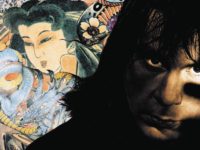“I can’t really discuss it … there’s a blank there as far as I’m concerned …” – Ian Hunter
Mott the Hoople: If most people even remember the British rockers at all, the name is usually associated with David Bowie and the song he wrote for them, “All the Young Dudes.” Some might even remember the glam-rock era from the early- to mid-1970s with which they were associated.
Beyond that, it’s all, well, shadows in stereo.
Yep, here we go again – another band that I don’t really get into until after they were gone. For me, they joined the ranks of the great and forgotten MC5, Stooges, and Velvet Underground. Of course, in the late ’70s, the U.S. mutation of the up-and-coming punk scene was based around a handful or dilapidated clubs in and around New York City where these American godfathers of punk were venerated by the new wave of rock ‘n’ roll.
I didn’t live in the Big Apple; besides Mott the Hoople were from the U.K. anyway. Still, it was interesting that the vanguard of the punk scene across the pond seemed to appreciate the Who and Mott the Hoople at least as much as they reviled the Rolling Stones (too decadent) or Led Zeppelin (too bombastic), or everyone else (too boring).
Although their Columbia releases such as All the Young Dudes, Mott, The Hoople and Live have stayed pretty much accessible in one form or another, the albums that make up the first half of their catalog, Mott the Hoople, Mad Shadows, Wildlife and Brain Capers haven’t always been easy to find. To further complicate matters, after frontman Ian Hunter left the band, they truncated their name to Mott, recorded a couple more albums, then changed their name to British Lions and recorded yet a couple more before calling it quits, at least until they reformed for the inevitable latter-day reunion concerts.
In any case, their eclectic mix of Dylan-esque folk rock, glam leanings, occasional prog-type forays, proto punk/metal and basic rock ‘n’ roll meant that they might have achieved success just because of their broad appeal. Instead, their records were often simply seen as wildly inconsistent. As such, any given album has its peaks and valleys, and it can be argued the best way to understand the band is simply to listen to all of it.
A good place to start is Mental Train: The Island Years (1969-1971). On that compilation, one can hear: the exquisite covers of Sonny Bono’s “Laugh at Me” and Dion’s “Your Own Back Yard”; the powerful (and wonderfully titled) “Death May Be Your Santa Claus”; and Mick Ralphs’ featured vocal take on “Thunderbuck Ram,” long before he moved on to fame and fortune as a founding member of Bad Company.
After that, there are any number of compilations celebrating the back half of Mott the Hoople’s career, the best of which would have to include the previously mentioned glam anthem “All the Young Dudes”; Ian Hunter’s indictment of the music industry, “Marionette”; and “I Wish I Was Your Mother,” which despite its odd title must be one of the most beautifully yet broken ballads ever written.
Finally, I also recommend the Mott/British Lions coda, not just in the interest of completeness, but because I happen to think there is decent material to be found on those albums as well. (Just be prepared for a different aesthetic than the earlier version of the band.)
“I feel neglected, feel rejected – living in the wrong time,” Ian Hunter sings in “The Moon Upstairs.” If there were ever a prescient moment in rock ‘n’ roll, this might be it. Fortunately, the magic can always be found in the music, if you know where to look for it.
- How David Bowie’s ‘The Next Day’ Stripped Away All of the Artifice - March 15, 2023
- Why Deep Purple’s ‘Who Do We Think We Are?’ Deserves Another Listen - January 11, 2023
- In Defense of the Often-Overlooked Mott the Hoople - November 10, 2022




